 |
| They will stand forever. |
The villages of the dead are 4 in number, arranged thus:
First is Hemlock-All-around, where from every branch on every tree a goblin hangs, hollow-faced, eagle down sprinkling the earth from empty orifices.
Second is Maggots-Writhing-on-Bark, where ghosts linger staring blankly or falling to the floor, then to gibber and howl and writhe as if their bones were aflame.
Third is Devouring-Mouth-of-the-Earth, were ghosts cower in half-collapsed houses while hunched & massive shadows stalk the alleys seeking to devour them.
Fourth is Never-Return, and I have not seen it, nor have any that recovered to speak of it to the living.- Akomish spirit-canoer's report
We
do not really live in the world. We journey there, winding the wood or
skimming the sea, even on occasion grasping toward the Moon. But Man is
limited and liminal, dwelling in exceptions, on the borders of places,
in prairies and on riverbanks, wedged between sea and forest and sky.
The
real world, the true one that stretches on forever beyond the sight of
Man, found somewhere out in the tall trees or rolling slowly over the
deepwater, is the Kingdom of the Dead.
But
a right-thinking Man of good breeding limits his exposure to such
things. He knows the world and his place in it - mind filled with the
name and quality of every cape, hollow, and crag. He couldn't possibly
lose his way or become lost, shielded by certainty of his mastery.
And yet, he may be led astray.
By birdsong or child's laugh or faint firelight, by promises of wealth
or warmth, primal urges from beyond the ken of men may coax the
otherwise sensible from their path, off into the wild.
And
these creatures - ghosts and sprites and wilderlings all - they have a
King. When the lost flitter about in fear and confusion and pain, only
then to tire and cry out their despair, surrendering to sleep a final
time, then He is there, at their side, sudden as flame.
The Road
The
following may in certain regions of the Mythic Wilderness serve as
substitution for the normal procedures that follow "Becoming Lost".
Determine
whether the party becomes Lost as normal for terrain (noting carefully
the impact of traveling known trails on this chance). Subsequently,
instead of rolling for random movement direction, the party's location
on the hexmap does not update while Lost. They are assumed not to have
made meaningful progress toward their destination, instead beginning to
move along a different axis entirely.
If
while already Lost, the party is determined to be Lost again, they
become Twice-lost. While in this state, there is a 2 in 6 chance that
any discovery or encounter is replaced with an equivalent Lost Encounter
(see below).
If the party becomes Thrice-lost, this chance increases to 4 in 6.
If
the party is determined to be lost a fourth time, they are Truly Lost.
The chance of a Lost encounter is now 6 in 6. At this point the party is
no longer on the hexmap proper, having crossed fully into the
deadlands: The trees twist in on themselves, directional markers are
conflicted and meaningless, daylight dims and refuses to change, etc.
A
party cannot become Lost a fifth time. If this is rolled, they instead
reach an endpoint to their journey. There are a number of potential
destinations for this, but some examples are:
- The Hemlock Throne, seat of the nameless King.
- A grave of the Wind that Bites from the Dark, strewn along the Road to the Moon.
- The Slanted Lodge, where shadows dance.
- The abode of a great spirit, such as a Wealth-bringer, Grizzly Mother, or Inland Whale.
Once
such a location is discovered, it generally haunts the party until they
return to civilization. While they remain Lost, they always steadily
approach it. There was never any other option.
Lost Encounters
A d20 is thrown to determine the character of a Lost Encounter:
- Spatial drift. When the party ceases to be Lost, update their location on the hexmap 1 space to the North. These changes are cumulative.
- Spatial drift. When the party ceases to be Lost, update their location on the hexmap 1 space to the Northeast. These changes are cumulative.
- Spatial drift. When the party ceases to be Lost, update their location on the hexmap 1 space to the Southeast. These changes are cumulative.
- Spatial drift. When the party ceases to be Lost, update their location on the hexmap 1 space to the South. These changes are cumulative.
- Spatial drift. When the party ceases to be Lost, update their location on the hexmap 1 space to the Southwest. These changes are cumulative.
- Spatial drift. When the party ceases to be Lost, update their location on the hexmap 1 space to the Northwest. These changes are cumulative.
- Lost encounter.
As normally-rolled encounter, but indicated creatures are lost,
distressed, paranoid. They feel they are being chased, harried by
spirits or unseen monstrosities. -4 to Reaction. If the normal encounter is supernatural, it
instead seeks something in a chase.
- Lost encounter. As normally-rolled encounter, but indicated creatures are lost and eerily not
distressed. They are calm. They want you to stay here, to give up on
worry, to find a sweetly rotting bed to lie upon. Staying with them
invites attack from ghosts in the night. (These ignore the initially
encountered creatures.)
- Lost encounter. As
normally-rolled encounter, but what is evidenced from a distance is
simply not found to be present at all. For example, copious tracks or
distant shouting lead to a clearing with no signs of recent habitation.
- Lost encounter.
As normally-rolled encounter, but instead of any creature,
there is instead only copious evidence of presence. For example, an
empty camp with food still cooking on the fire. (Resting at such a place
causes a time distortion, see #19.)
- Lost encounter.
As normally-rolled encounter, but indicated creatures are corpses,
laying dead on the ground. 2 in 6 chance they rise as ghosts if
disturbed.
- Lost encounter. As normally-rolled
encounter, but when approached these are revealed to not really be
creatures after all, but instead carved wooden figures erected in a
posture that perhaps resembles some sort of encounter. They've been
rotting for years.
 |
| Along avenues made open for you. |
- Otters.
An encounter with Otters, such as: The camp of a friendly family of d6
Land Otters, in human form. They offer you rest, and to guide you home
in the morning. They want you to leave your dogs far outside their camp
and will not say why. They offer you food. Accepting this aid increases
the level of Lost, or causes lethargy and soul loss if already Truly
Lost. (To a member of the Growling Cult: A crude collection of mud huts
inhabited by foul-smelling beastmen.)
- Slim people. An
encounter with Slim People, such as: A deer is staked out in the open,
hung between trees, gutted. It is highly visible from a decent distance,
obvious. The meat is still good. The trees near it are hung with
figurines of bundled sticks. When approached, 2d6 Slim People, scattered
across the forest floor nearby, rise to attack.
- Ghostly rot.
Something falls, dies, or rots in the immediate vicinity, leading to an
encounter with the Lost, such as: A tree crashes down from somewhere
uphill. The party is targeted by a Tree Striker. Its effective range is
equal to the average height of trees in this region. How fast can the
party move?
- Ghostly music. Heard in the distance,
leading to an encounter with the Lost, such as: A whistler's glade where
a Lost Child cavorts, animating 2d6 carved wooden animals with his
flute, attacking intruders unless they dance and dance and dance as
partner to his idols. If his flute is stolen (it retains a portion of
his magic), he turns to wood as well.
- Ghostly fire.
Seen in the distance, leading to an encounter with the Lost, such as: A
camp of 2d6 Ashen Ghosts crouched around a dim campfire. They appear as
normal humans in the flickering light. They want you to help build up
their fire. To teach them how to build fire. To make it hotter. To
gather materials for the fire. To put your possessions in the fire.
To put yourself in the fire.
- Ghostly weather. Odd or unseasonable weather phenomena is observed, leading to an encounter
with the Lost, such as: The sun dawns, regardless of what time the
party previously thought it was. The land remembers its beginnings.
Morning fog surrounds, tinged slightly darker than it should be. It
burns off in a few hours, but if traversed the party is harassed by a
Dawn Shadow.
 |
| Patience is a virtue of the dead. |
- Lost woods. After an entire turn of travel, you find yourself approaching exactly the same place as where you started out from. Once this is rolled, its effect also replaces all results 1-6. If this specific entry (#19) is rolled again, then the party also suffers a time distortion on ceasing to be Lost, an additional 2d6 hours having passed by without their notice, changing the time of day unexpectedly. For each additional result, the time distortion explodes upward (hour → day → lunar month → season → year → generation).
- Dead road. You have found
your way behind the trees, where the dead roads wind. A dry creek, a
corridor of fallen timber, a laid-down bed of shredded cedar, a
continuous chain of moonlight, a set of tracks suspiciously similar to
your own - appearances vary. One way leads into the daylight - following
it for a turn removes all levels of Lost and deposits the party at a
site (preferably undiscovered) within their updated hex location. The
opposite direction leads into darkness, to be harassed by hungry ghosts,
and eventually to Hemlock-All-around, first village of the dead.
The House
 |
| Behold! A King in his finery! |
I bide among the twisted pines,and none recall my name.I have no friend or relativefor all near me must perish.Into the wilds I departon roads kept by the dead.
- Gravetender's lament
There
is a King without name, propped limbless on a hemlock throne untouched
by sunlight at the heart of the world. Fearsome and strange,
many-masked, with heart of pitch and brine, He is King of Ghosts and
Woodsmen, the Wilderer of Ways and Keeper of Drowned Souls. It is He who
confounds the hunter and mazes the amnesiac, dooming all to wander in
hunger and lack forever and ever.
His kingdom is one of confusion and loss, of calling forth by name, of slowly fading memory, and of strangers wandering alone. He appears as a rot-scarred cedar box carved with fishers afloat on the sea, an injured and algae-soaked fox digging at an unmarked grave, a faceless child playing a flute, or a disorganized pile of greening bones set on an overgrown hemlock stump. He is heralded by the sound of a bone flute whistling in the distance, and by uncanny fogbanks moving slowly and deliberately through trees or over water.
His kingdom is one of confusion and loss, of calling forth by name, of slowly fading memory, and of strangers wandering alone. He appears as a rot-scarred cedar box carved with fishers afloat on the sea, an injured and algae-soaked fox digging at an unmarked grave, a faceless child playing a flute, or a disorganized pile of greening bones set on an overgrown hemlock stump. He is heralded by the sound of a bone flute whistling in the distance, and by uncanny fogbanks moving slowly and deliberately through trees or over water.
Gravetenders
are known to appear suddenly and without warning, to converse with the
dead, and to enforce the taboos against touching dead bodies or
pronouncing dead names. In hidden sanctuaries near each village their
corpse-groves stand, hung with bodies and piled with offerings, scented
with incinerated foodstuffs brought forth to placate lost ancestors.
Most villages are willing to provision these encampments, but otherwise
studiously avoid acknowledging their existence.
 |
| My house has many rooms. |
The
Gravetender is ritually dead and nameless, and must remain so. They are
unmarried and not a member of any family, clan, or moiety. They own no
possessions, though few would attempt to take from them what they keep
on their person. A Gravetender may not recruit mortal retainers. Their
very name, along with all its deeds and properties, has been eaten by
the dead.
A Gravetender that is called by their eaten name loses access to all society powers and has disadvantage to all
rolls and checks. They must immediately make new reaction rolls for all
ghosts in their presence (at disadvantage). All is restored when the
Gravetender next becomes Lost. (Note they will also have disadvantage on
the normal roll to avoid becoming Lost.)
But
the name is not theirs, and its misuse calls out for recompense due its
new owners. The one that uttered this eaten name is thereafter treated
with hostility by all ghosts, which attack them on sight. They also have
disadvantage on saving throws against hostile magics and rolls to avoid
becoming lost, as the dead roads open to them. This lasts until the
Gravetender's powers are restored, or until they die truly. If the
offending individual is ever Lost to even a single level, all random
encounter will contain packs of hostile ghosts intent on devouring them.
 |
| I have prepared a place for you. |
Veteran (level 1) Gravetenders gain several advantages while
Lost, a state they recognize instinctively: They do not age, do not
require food or water, and have advantage on all saving throws.
Encounter distance is always treated as the maximum roll.
Gravetenders
may also command ghosts and otters, just as a skilled tamanous man
might. Resolve this as a Turn Undead check. A commanded ghost or otter
may always lead the Gravetender's party out of being Lost in a single
turn.
Heroes (level 4) of the society can bind ghosts, and speak those bound into their presence.
On a result of "D" on the Turn Undead table, the spirit in question is eaten.
The Gravetender takes their name, their shadow, and their memories. The
spirit occupies a retainer slot. Note that eating the spirit of one of
the honored dead makes one immediately hostile to all of their
relatives, unless explicitly retrieving their ghost in order to return
it to the family. Such ghosts are under no obligation of faith to the
Gravetender. The dishonored dead may be enslaved without repercussion.
The
Gravetender may be called by the name of an eaten ghost without
mechanical consequence, though doing so is considered taboo by the
society, resulting in a disadvantage to Reaction.
A
bound ghost may be manifested in the shadows over living water or the
smoke of a fire. Only other Gravetenders, blood relatives, and those
with the ability to detect magic or the invisible will see them.
(Skeleton Dancers will also, but they are reticent to admit this due to
the general animosity between the two societies.)
At this level a Gravetender also may choose to gain advantage or disadvantage on any roll to become Lost.
Superheroes (level 8) of the society may speak bound ghosts into corpses (as Weeping Ghost) or specially carved wooden simulacra (as Rotting Ghost) and force them to do their bidding. The ghost is freed if reduced to 0 hit points, but may otherwise be consumed again by the Gravetender as normal.
As a Group Ritual a convocation of Gravetenders may bury a
petitioner's name, giving it to the dead that it may no longer be used
by the living. A buried name takes with it all its rights, privileges,
and accomplishments, but also all of its debts and curses. This service
requires gift of 1d6×250gp in foodstuffs and other offered gravegoods,
as well as access to a corpse grove, burial islet, cavern of the dry
ones, or similar collection of honored dead. These are feasted and
danced in imitation of the naming ritual, during which the name is
folded into their repast and burned. If this was the petitioner's final
remaining name, they must immediately
be initiated into the Gravetender's Society or become afflicted with a
rapid and deadly wasting.
Though not widely known, the Gravetenders can also give the name of a place to the dead. This location can no longer be found by normal means, and instead becomes a Lost Encounter associated with the hex it was formerly found in. The requirements are similar, involving a corpse parade to the location in question and 1d6×2000gp in goods and ritual materials.
Do not weep for the dead. Give them nothing but what is offered on the pyre, for they will take everything
from you. Your voice, your shadow, your power, the warmth of your skin,
even your life - every living thing about you. For if you are dead,
then you will join them in the deadlands, and all your ghostly relations
will rejoice.
The dead are lonely; they miss their relatives. Spirits tend to linger
awhile on the mortal plane before departing to the afterlife. It is
during this time that they are most dangerous.
It
is said that when you say a ghost's name, they immediately know your
location. If you cry for them, their way to the deadlands is marshy and
slow, increasing the likelihood they will turn back to haunt the
living.
Note:
Ghosts refuse to speak the trade jargon. It demeans them. To dialogue
with ghosts, one must know their native tongue or converse in a manner
entirely spiritual.
- Stutter-Ghost [skayuɁ] (HD 1, AC 15, MV 18). A skeleton, floating just off the ground. Walks (does not run) at high speed with queer, shimmering motion. Jaw clatters out rapid falsetto “ku'kuku ku'kuku” repetition. Steals hair, save vs. confusion. When broken, bones vibrate around and eventually reform, sticking like magnets. Slain by magic. Some shoot nettle-arrows, which steal victim's breath.
- Weeping Ghost [dᶻaqayuɁ] (HD 2, AC 12, MV 12). Crying corpse with ragged clothing, hair torn out in clumps clutched in clawed hands. Originally mortals who gave tears to the dead. Grapples into embrace, then drips tears on target's flesh, save vs. uncontrollable weeping. If afflicted falls asleep in this condition, save or become undead.
- Rotting Ghost [p'q'acayuɁ] (HD 1, AC 14, MV 9). Pathetic
corpses who carve sub-par wooden replacement parts to hide their rotting
flesh as bits of them drop away. Grasp steals warmth. Those without hands to
grasp instead club with over-sized, inarticulate wooden hands.
- Hungry Ghost [scəwəɫ] (HD 2, AC 13, MV 9). Leftover hunger of the dead wearing a withered black corpse. Eats anything recognizably food. Relishes flesh of men and dogs. Tracks both easily. Speaks only to deceive & lure into traps and artifices. Otherwise silent except when leaping to attack, when throat emits a low groaning. Dogs detect them easily, but check morale on sight.
- Ashen Ghost [Ɂukʷ'as] (HD 2, AC 12, MV 12). Pale, sickly,
smeared with ash. Stomach a patch of glowing embers, concealed with
tattered hides. Soul is a smoking flame in their belly. Drawn
to fires, perching nearby to suck up smoke and swallow coals. Violently
expel intruders that threaten flame. In combat skin blisters and
sizzles, vomit hot coals into hands to hurl at enemies.
- Headless Ghost [sx̌ʷəyalq] (HD 3-6, AC 13, MV 9). Headless bodies of men, bears, or ducks. Shine like they're vibrating. Attempt to eat but cannot, smashing food into absent face, and grow angry. Pause and rear as if to issue a great bellow, soundless, but all present struck save vs. fear. This lingers, provoking new save at the start of each combat for 24hr.
- Red-eyed Shadow [c'alminəlus] (HD 3, AC 12, MV 9/12f). Shades who hide from death behind the souls of trees. Only perceived as diminishment of visual acuity. Attempting direct attack causes migraines and visual anomalies of undulating color that blur and stretch. Must be attacked peripherally, but if possible they dance into direct view. Bones are hidden up in a tree somewhere nearby – shade reforms if not destroyed.
- Dawn Shadow [xʷiyəlan] (HD 6-9, AC 12, MV 6f).
Memories of life before light touched the world, shapes from ancient
epochs half-remembered in acrid black smoke, eyes shining. Immune to
mundane weapons but dispersed by wind. Presence chokes the air; each
round in melee save vs. coughing. Appear in mornings, before the sun
hits direct, at the beginnings of things.
The
Old People still exist in the world, though most remain hidden. In the
deepest stretches of the elder wood, in overgrown marshes, gullies, and
creeks. They clamber amongst the underbrush, or drop from above.
Most
fear them, regardless of whether they have done aught to provoke their
ire, and few are those brave or mad enough to approach them as they
gather to dance in their hidden groves.
Dwarfs
are highly sought by sorcerers as familiar spirits. The dwarfs of yore
made mighty spells, it is claimed. Some say they danced the first
forests into being, that they know the songs that made the trees grow
tall.
But
the true value of dwarfish familiars is their connection to the lost
and the dead. They know the dead roads and can lead mortals to the
deadlands. Though ghosts have similar ability, and in fact are easier to
placate, they are also given to madness, leaving dwarfs the most
reliable source for this essential power.
- Little Forest [swəw'tixʷtən] (HD 2, AC 4, MV 9/12f). 2' dwarf made of forest debris. Walks on treetops, leaping branch to branch. Speaks in a watery gurgle, save vs. confusion. Can dance your soul out of your body. Each is bound to an idol depicting a stylized man of their size, usually hidden in some dark and secret grove. May range from idol, but usually do not wander far, as possession of it grants power over them.
- Tree Striker [šəčəčičələɁ] (HD 4, AC 15, MV 9/12f). Horribly misshapen, 2' dwarf made of forest debris. Walks on treetops, leaping branch to branch. Idol long-shattered, what remains is a cane that fells fully grown trees with strike, ranged 2d6 in a line. Cane may be used by men, but in mortal hands explodes violently on an attack roll of 1. Strike easily opens doors and chests.
- Lost Child [makʷamš] (HD 1, AC 13, MV 15). Corpse-thin, gangle children, dressed all in leaves with fancifully carved masks. Skinny limbs flutter in frantic caper, leaping and cackling. Leaps away when missed, usually high into trees. Play woodwinds. Knows a song to remove all sense of direction, making Lost. Knows a song to calm the dead.
- Lost Ancient [Ɂiɫluƛ]
(HD 3, AC 13, MV 15). Older than human: pale green and goblinish,
hook-nosed, wolf-eared, round inhuman eyes glowing red in deep sockets.
Teleports away when missed. Does not play flute; just speaks that way.
Presence saps warmth from things, invoking supernatural cold. Knows a
magic sound to make trees explode in frost, 2d6 damage in an area.
- Earthquake Dwarf [gʷingʷinaɁmixʷ]
(HD 1, AC 17, MV 6). Entice people beneath mountains to dance with
"earthquake feet". Flesh hard as stone, attacks with crushing strikes.
Jealous of all soft things owned by men. Knows a drumbeat that compels
men to dance. Knows a dance to cause an avalanche. Explodes in a shower
of stone when slain, d6 in 30'. Rumors tell of "obsidian dwarfs" that
deal slashing, explode more violently.
- Aurora Dwarf [qʷiqʷəstay'mixʷ] (HD 1, AC 12, MV 9/9s). Super-strong, 3½' dwarfs living on iceflows. Dive in freezing water to catch whales and seals by hand and scoop dentalia from sea floor. Their blubber-fires built on ice create the aurora, which they dance into enemies' eyes to confuse and mislead (as color spray). Immune to knives and arrows, but damaged by prick from feathers of waterfowl.
Enhydra lutris, Lontra canadensis
Never trust an otter.
This
is important. Stay focused. Try to hold it in your mind. Even at point
of death, when freezing or drowning alone,
keep your guard. When they arrive in their boats with hairy arms
outstretched, torsos and
heads bobbing disproportionate long, do not accept their assistance.
They do not want you to find your way home. They do not want you to
survive this encounter. They are abductors. They want you to freeze and
starve and become like them.
If you forget or lose faith, they will take you to the
land of the otters. And then there is nothing left for you but a life of beastly
stalking. You will spend the rest of your days eating fish raw and luring men to their doom.
Trust
dogs. The bark of a dog can dispel an otter's false voice. The bones of
a dog, sharpened to knife-edge, can cut away an otter's false skin. The dog is man's oldest ally in the wild.
Remember:
do not trust otters. Don't forget. Stay focused. Remember.
- Sea Otter [sq'aƛ']
(HD 1 - 6, AC 13, MV 12/18s). The sea pulls at the skins of otters,
which they can use to command waves with a gesture. If a canoe contains
otterskin or a man wears it, they may be grappled by waves. Otters of
sufficient size use these powers to capsize canoes and drown their
occupants. Those with HD greater than 1 are rare, but sightings
exist. Each HD accompanies a commensurate increase in size, and
disproportionate lengthening of the neck.
- Rain God [qəlmax̌aɁ] (HD 8, AC 15, MV 9/24s). An otter deity, huge and long-necked. Controls rain and raises water levels. Renders gunpowder wet and unusable. In human form, a giant, nude but for copious copper jewelry.
- Land Otter [kuštakaɁ] (HD 5, AC 13, MV 9/15s). Skinchangers that shift from otter to man. Always appears a friend or relative. Eyes black and teeth sharp and otterish. Dog bark reveals true form. Tongues command canoes to capsize, land to slide from position, and men to fall drowsy and numb. Offer food and aid to the lost and the drowning; accepting any provokes soul loss. On death, become a new kuštakaɁ. Flesh twists away from normal weapons, but dog bones cut them. Value crab shells as money, used to construct drums and rattles.
- Half-Otter [qaqix̌in] (HD 3, AC 13,
MV 9/9s). The half-drowned, starved and thin with oversized head and
belly, long torso, greening skin, watery blue eyes. Overlarge lips
pierced by urchin quills caked with dried blood, teeth chipped and
missing from crunching inedible seaside life. Shadow causes save vs.
confusion. They want to be led home, but always describe a place beyond
the sea. The uncooperative are raked by pale claws. Too determined to be
fully slain by violence, they must be reminded they are dead, with mirrors,
with human food, or with the usage of their name by relatives. In
daylight, they disrobe and burrow in sand.
Owl-men, Wood Ghosts, Elfs
Heed not the whistling in the wood. Never traverse the
mountain passes alone. Be wary of owls, who act as their eyes and tongues.
Hunters
of men, inimical to civilization, the Slim People lurk in deepest
forest and
highest mountain vale, in the furthest reaches upriver. What relation
they have to the inland pit-dwellers we cannot say, for the pit-people
disavow any knowledge of them despite haunting the very same reaches.
None
have reported seeing Slim People in the daylight; perhaps they only
exist at night.
A
captured adult is sure to be devoured, but children, if they do not
resist overmuch, may survive by becoming Slim themselves.
Occasionally little bundles of twigs in vaguely manlike shapes are found
where the Slim People have been. It is believed that this is all lost
children can do to communicate to their relatives that they are still
living.
- Stick Man [stitaɫ] (HD 3, AC 14, MV 15). Impossibly tall and thin naked humanoids with knobbly brown skin and hollow eyes. Lie motionless on piles of fallen timber, nigh-invisible. Mouths emit only birdsong or child's laughter, which compels listener to wander into the woods. Otherwise completely silent.
- Spear Spirit [tayutan] (HD 6, AC 14, MV
18/12c). Stick Man war spirit. Longer of limb, not bulkier. All its
extremities are cruel spikes & splinters. Drops on foes from above to
attack. Climbs rapidly, out of sight. Near-invisible when motionless in
the branches.
- Spotted Owl [skʷəqʷumš] (HD ½,
AC 14, MV 24f). Those slain by fright, screaming too
loud for too long (or more commonly, infants smothered in their cribs),
lose their living voice and return as owls. May speak to the dead, call
to the
dying across great distance, and foretell the future. Steal the breath
of those who speak living language in their presence (save vs. shortness
of breath), used to advantage by Stick Men.
- Horned Owl [təkʷəkʷəlus]
(HD ½, AC 14, MV 24f). Horned owls collect teeth and bones. They seem
to trade trinkets for these, but prefer to steal them. An owl who
collects the teeth or fingerbones of a dead shaman and holds them in the
mouth gains all the knowledge and power they possessed. These serve as
great sorcerers among the Stick Men. They are the only among their
entourage known to speak.
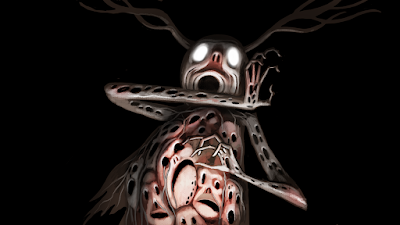 |
| DON'T LOOK AT ME! |

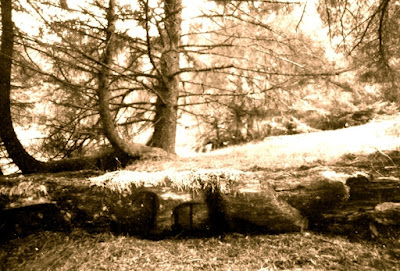





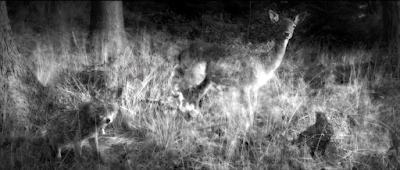


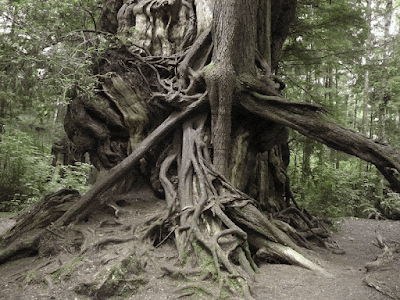













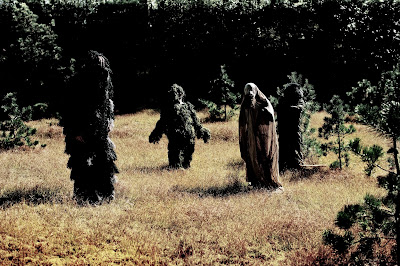


















.jpg)

